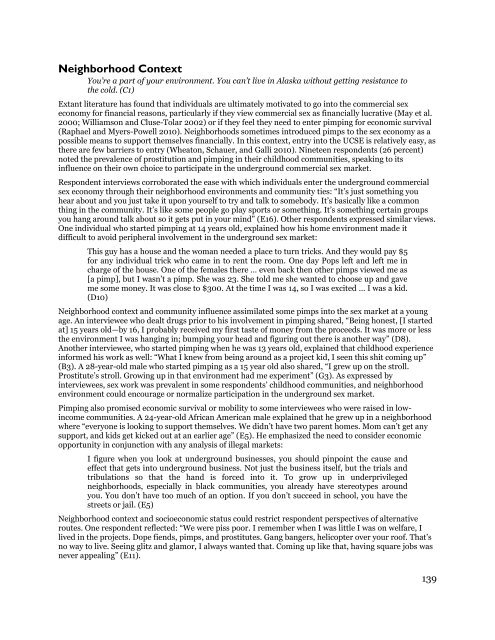413047-Underground-Commercial-Sex-Economy
413047-Underground-Commercial-Sex-Economy
413047-Underground-Commercial-Sex-Economy
Create successful ePaper yourself
Turn your PDF publications into a flip-book with our unique Google optimized e-Paper software.
Neighborhood Context<br />
You’re a part of your environment. You can’t live in Alaska without getting resistance to<br />
the cold. (C1)<br />
Extant literature has found that individuals are ultimately motivated to go into the commercial sex<br />
economy for financial reasons, particularly if they view commercial sex as financially lucrative (May et al.<br />
2000; Williamson and Cluse-Tolar 2002) or if they feel they need to enter pimping for economic survival<br />
(Raphael and Myers-Powell 2010). Neighborhoods sometimes introduced pimps to the sex economy as a<br />
possible means to support themselves financially. In this context, entry into the UCSE is relatively easy, as<br />
there are few barriers to entry (Wheaton, Schauer, and Galli 2010). Nineteen respondents (26 percent)<br />
noted the prevalence of prostitution and pimping in their childhood communities, speaking to its<br />
influence on their own choice to participate in the underground commercial sex market.<br />
Respondent interviews corroborated the ease with which individuals enter the underground commercial<br />
sex economy through their neighborhood environments and community ties: “It’s just something you<br />
hear about and you just take it upon yourself to try and talk to somebody. It’s basically like a common<br />
thing in the community. It’s like some people go play sports or something. It’s something certain groups<br />
you hang around talk about so it gets put in your mind” (E16). Other respondents expressed similar views.<br />
One individual who started pimping at 14 years old, explained how his home environment made it<br />
difficult to avoid peripheral involvement in the underground sex market:<br />
This guy has a house and the woman needed a place to turn tricks. And they would pay $5<br />
for any individual trick who came in to rent the room. One day Pops left and left me in<br />
charge of the house. One of the females there … even back then other pimps viewed me as<br />
[a pimp], but I wasn’t a pimp. She was 23. She told me she wanted to choose up and gave<br />
me some money. It was close to $300. At the time I was 14, so I was excited … I was a kid.<br />
(D10)<br />
Neighborhood context and community influence assimilated some pimps into the sex market at a young<br />
age. An interviewee who dealt drugs prior to his involvement in pimping shared, “Being honest, [I started<br />
at] 15 years old—by 16, I probably received my first taste of money from the proceeds. It was more or less<br />
the environment I was hanging in; bumping your head and figuring out there is another way” (D8).<br />
Another interviewee, who started pimping when he was 13 years old, explained that childhood experience<br />
informed his work as well: “What I knew from being around as a project kid, I seen this shit coming up”<br />
(B3). A 28-year-old male who started pimping as a 15 year old also shared, “I grew up on the stroll.<br />
Prostitute’s stroll. Growing up in that environment had me experiment” (G3). As expressed by<br />
interviewees, sex work was prevalent in some respondents’ childhood communities, and neighborhood<br />
environment could encourage or normalize participation in the underground sex market.<br />
Pimping also promised economic survival or mobility to some interviewees who were raised in lowincome<br />
communities. A 24-year-old African American male explained that he grew up in a neighborhood<br />
where “everyone is looking to support themselves. We didn’t have two parent homes. Mom can’t get any<br />
support, and kids get kicked out at an earlier age” (E5). He emphasized the need to consider economic<br />
opportunity in conjunction with any analysis of illegal markets:<br />
I figure when you look at underground businesses, you should pinpoint the cause and<br />
effect that gets into underground business. Not just the business itself, but the trials and<br />
tribulations so that the hand is forced into it. To grow up in underprivileged<br />
neighborhoods, especially in black communities, you already have stereotypes around<br />
you. You don’t have too much of an option. If you don’t succeed in school, you have the<br />
streets or jail. (E5)<br />
Neighborhood context and socioeconomic status could restrict respondent perspectives of alternative<br />
routes. One respondent reflected: “We were piss poor. I remember when I was little I was on welfare, I<br />
lived in the projects. Dope fiends, pimps, and prostitutes. Gang bangers, helicopter over your roof. That’s<br />
no way to live. Seeing glitz and glamor, I always wanted that. Coming up like that, having square jobs was<br />
never appealing” (E11).<br />
139


